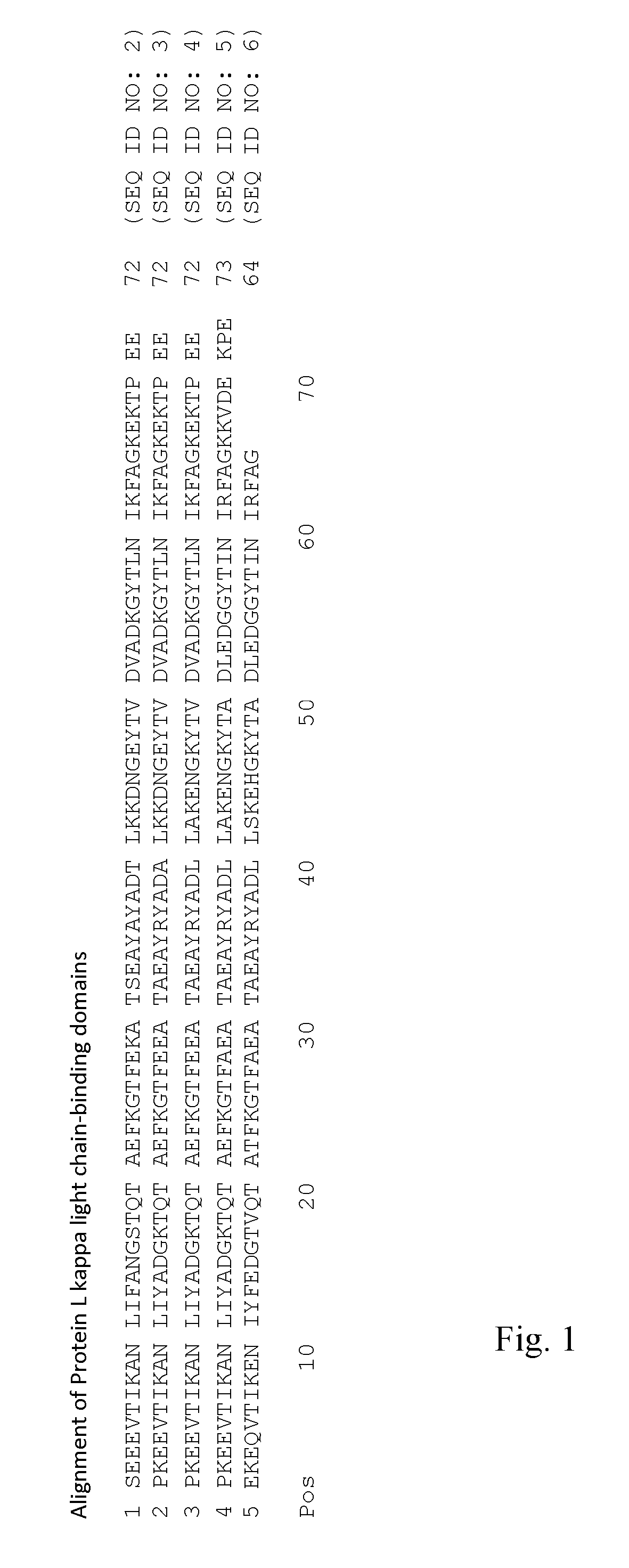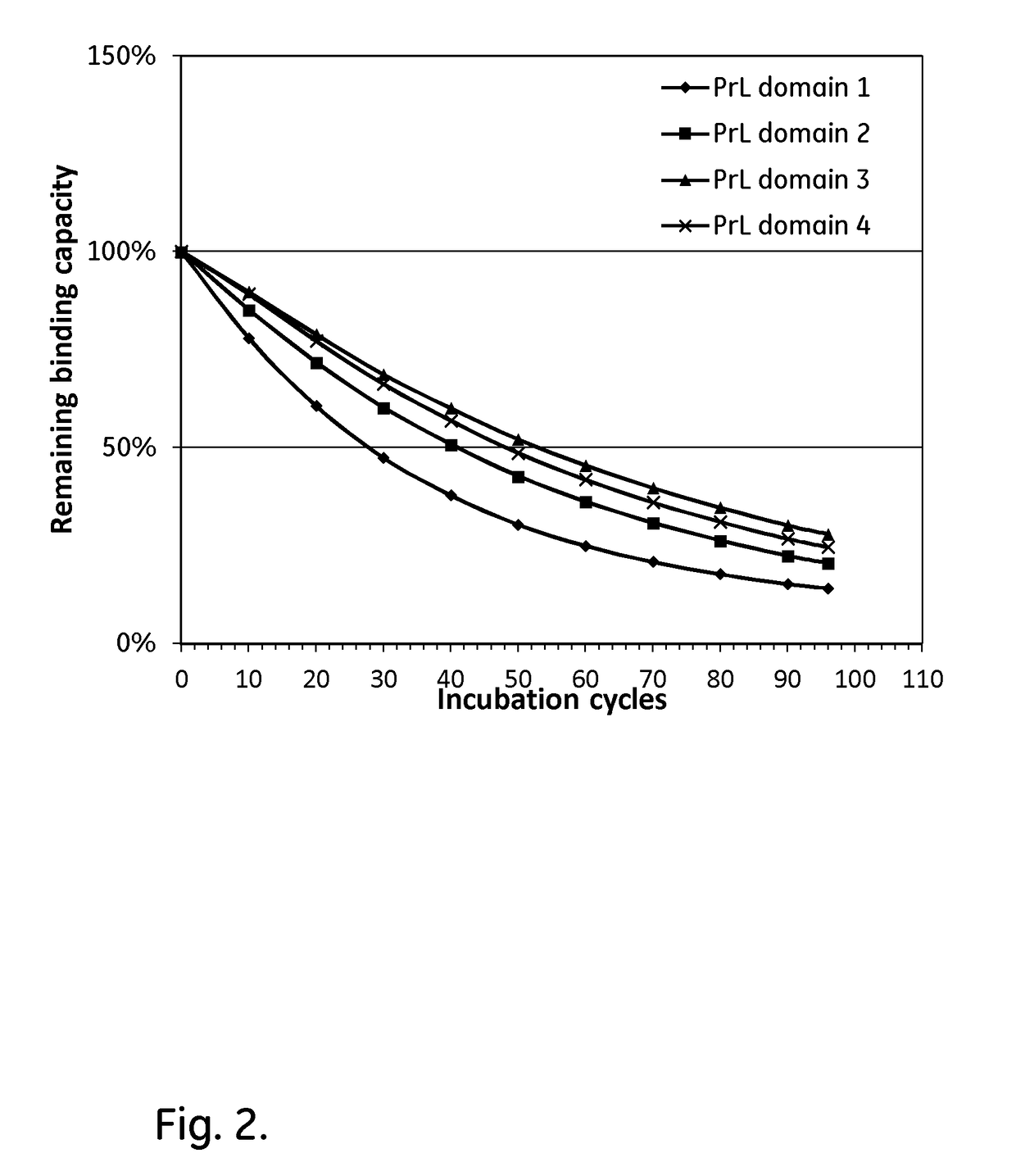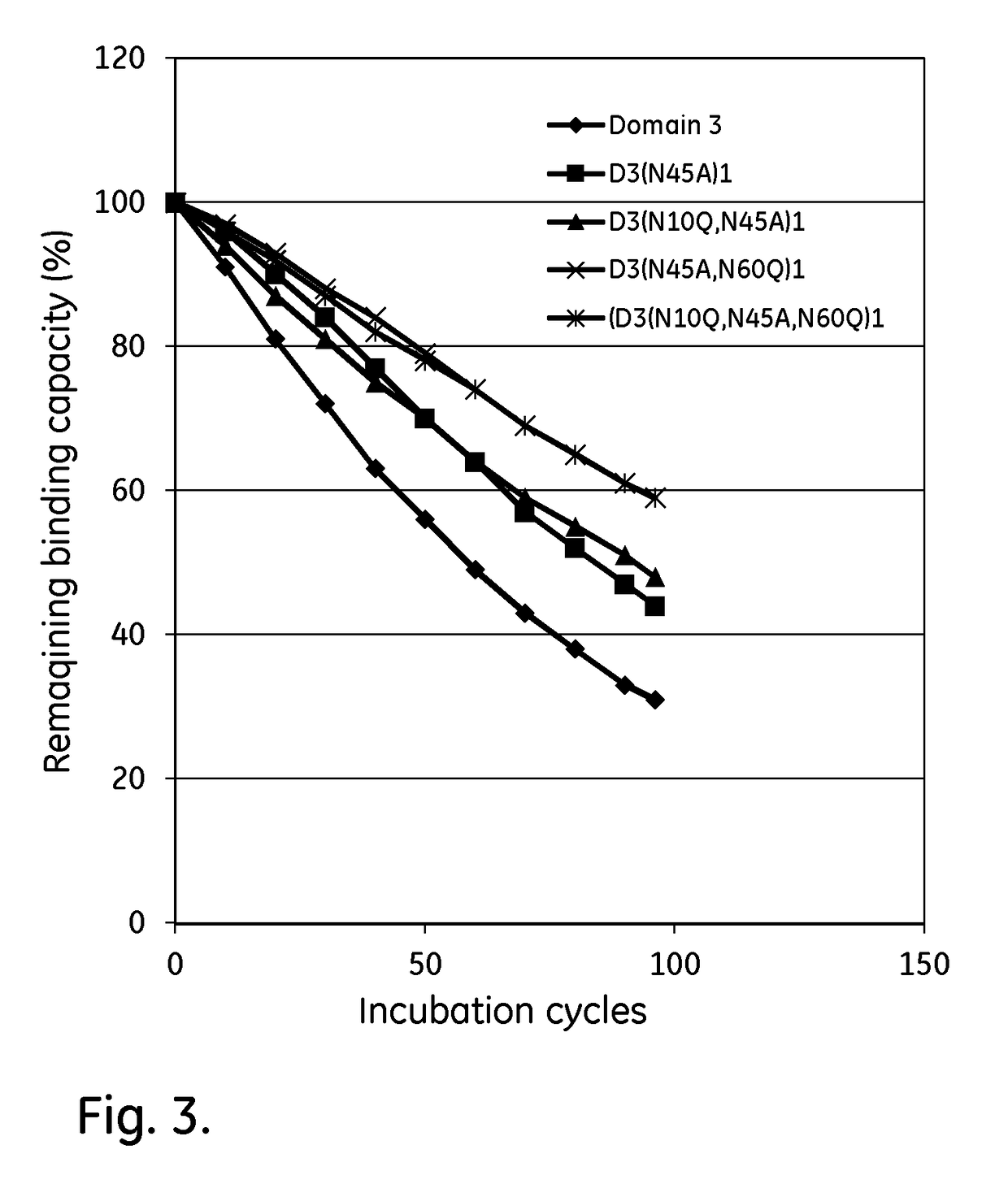Modified Kappa Light Chain-Binding Polypeptides
a light chain-binding polypeptide and modification technology, applied in the field ofaffinity chromatography, can solve the problems of inconvenient use, less desirable cleaning solutions, and addition of urea or guanidinium, and achieve the effects of improving alkaline stability, high selective binding, and improving alkaline stability
- Summary
- Abstract
- Description
- Claims
- Application Information
AI Technical Summary
Benefits of technology
Problems solved by technology
Method used
Image
Examples
example 1
[0075]The purified monomeric ligands listed in Table 1, further comprising, in the cases of the non-mutated single domains, a cysteine at the C terminus and an AQV sequence at the N-terminus, were immobilized on Biacore CMS sensor chips (GE Healthcare, Sweden), using the amine coupling kit of GE Healthcare (for carbodiimide coupling of amines on the carboxymethyl groups on the chip) in an amount sufficient to give a signal strength of about 1000RU in a Biacore instrument (GE Healthcare, Sweden). To follow the IgG binding capacity of the immobilized surface 1 mg / ml human polyclonal IgG (Gammanorm) was flowed over the chip and the signal strength was noted. The surface was then cleaned-in-place (CIP), i.e. flushed with 100 mM NaOH for 10 minutes at room temperature (22+ / −2° C.). This was repeated for 96 cycles and the immobilized ligand alkaline stability was followed as the relative loss of IgG binding capacity (signal strength) after each cycle. The results for the non-mutated domai...
example 2
[0076]The purified multidomain ligands listed in Table 2 were immobilized on Biacore CMS sensor chips (GE Healthcare, Sweden), using the amine coupling kit of GE Healthcare (for carbodiimide coupling of amines on the carboxymethyl groups on the chip) in an amount sufficient to give a signal strength of about 1000 RU in a Biacore instrument (GE Healthcare, Sweden). The Protein L had an additional AIHNRA sequence at the N-terminus. To follow the IgG binding capacity of the immobilized surface 1 mg / ml human polyclonal IgG (Gammanorm) was flowed over the chip and the signal strength was noted. The surface was then cleaned-in-place (CIP), i.e. flushed with 100mM NaOH for 10 minutes at room temperature (22+ / −2° C.). This was repeated for 96 cycles and the immobilized ligand alkaline stability was followed as the relative loss of IgG binding capacity (signal strength) after each cycle. The results are shown in Table 2 and FIG. 4 and show that the tetrameric Domain 3 has an improved alkali ...
example 3
[0077]The purified multidomain ligands listed in Table 3 were immobilized on Biacore CMS sensor chips and evaluated by the methods used in Example 2. −cys at the end of the ligand designation indicates that the ligand has a C-terminal cysteine in addition to the sequence defined by SEQ ID NO: 16-18. The results are shown in Table 3 and FIG. 5 and show that all the mutated Domain 3 dimers, tetramers and hexamers have an improved alkali stability in comparison with Protein L which was run in parallel as a reference.
TABLE 3RetainedcapacityRef.after 100capacitySample / ref.LigandSequencecycles (%)(%)ratioProtein LSEQ ID NO: 123231.00D3(N10Q, N45A,SEQ ID NO: 1659232.56N60Q)2D3(N10Q, N45A,SEQ ID NO: 1659232.56N60Q)2-cysD3(N10Q, N45A,SEQ ID NO: 1760232.61N60Q)4D3(N10Q, N45A,SEQ ID NO: 1754232.35N60Q)4-cysD3(N10Q, N45A,SEQ ID NO: 1858232.52N60Q)6D3(N10Q, N45A,SEQ ID NO: 1856232.43N60Q)6-cys
PUM
| Property | Measurement | Unit |
|---|---|---|
| temperature | aaaaa | aaaaa |
| optical density | aaaaa | aaaaa |
| temperature | aaaaa | aaaaa |
Abstract
Description
Claims
Application Information
 Login to View More
Login to View More - R&D
- Intellectual Property
- Life Sciences
- Materials
- Tech Scout
- Unparalleled Data Quality
- Higher Quality Content
- 60% Fewer Hallucinations
Browse by: Latest US Patents, China's latest patents, Technical Efficacy Thesaurus, Application Domain, Technology Topic, Popular Technical Reports.
© 2025 PatSnap. All rights reserved.Legal|Privacy policy|Modern Slavery Act Transparency Statement|Sitemap|About US| Contact US: help@patsnap.com



